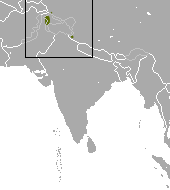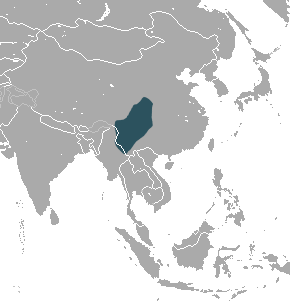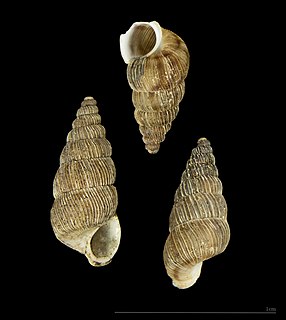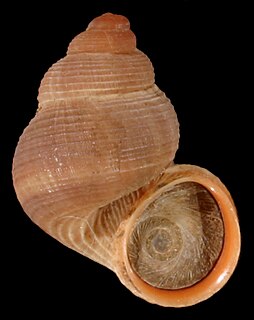
The International Union for Conservation of Nature (IUCN) Red List of Threatened Species, founded in 1964, is the world's most comprehensive inventory of the global conservation status of biological species. It uses a set of criteria to evaluate the extinction risk of thousands of species and subspecies. These criteria are relevant to all species and all regions of the world. With its strong scientific base, the IUCN Red List is recognized as the most authoritative guide to the status of biological diversity. A series of Regional Red Lists are produced by countries or organizations, which assess the risk of extinction to species within a political management unit.

Helix pomatia, common names the Roman snail, Burgundy snail, edible snail, or escargot, is a species of large, edible, air-breathing land snail, a pulmonate gastropod terrestrial mollusc in the family Helicidae. It is one of Europe's biggest species of land snail.
The Botanical and Zoological Codes of nomenclature treat the concept of synonymy differently. In botanical nomenclature, a synonym is a scientific name that applies to a taxon that (now) goes by a different scientific name. For example, Linnaeus was the first to give a scientific name to the Norway spruce, which he called Pinus abies. This name is no longer in use, so it is now a synonym of the current scientific name, Picea abies. In zoology, moving a species from one genus to another results in a different binomen, but the name is considered an alternative combination, rather than a synonym. The concept of synonymy in zoology is reserved for two names at the same rank that refer to a taxon at that rank - for example, the name Papilio prorsaLinnaeus, 1758 is a junior synonym of Papilio levanaLinnaeus, 1758, being names for different seasonal forms of the species now referred to as Araschnia levana(Linnaeus, 1758), the map butterfly. However, Araschnia levana is not a synonym of Papilio levana in the taxonomic sense employed by the Zoological code.

A species that is extinct in the wild (EW) is one that has been categorized by the International Union for Conservation of Nature as known only by living members kept in captivity or as a naturalized population outside its historic range due to massive habitat loss.

Gmelin's white-toothed shrew is a species of mammal in the family Soricidae. It is found in Afghanistan, China, Iran, and Pakistan.

The Kashmir pygmy shrew is a species of mammal in the family Soricidae. It is found in India and Pakistan.

The gracile shrew mole is a species of mammal in the family Talpidae. It is found in China and Myanmar.

Cochlostoma is a genus of land snails with an operculum, terrestrial gastropod mollusks in the family Cochlostomatidae.
Attenborougharion rubicundus is a species of air-breathing semi-slug, terrestrial pulmonate gastropod molluscs in the family Helicarionidae.

Pomatias is a genus of small operculate land snails, terrestrial gastropod mollusks in the family Pomatiidae.
Beauprea congesta is a species of plant in the family Proteaceae. It is endemic to New Caledonia.
Leucadendron nobile is a species of plant in the family Proteaceae. It is endemic to South Africa.
Roupala loxensis is a species of plant in the family Proteaceae. It is endemic to Ecuador.
Roupala sphenophyllum is a species of plant in the family Proteaceae. It is endemic to Peru.
Stenocarpus dumbeensis was a species of plant in the family Proteaceae. It was endemic to New Caledonia.
Bat Conservation International (BCI) is an international nongovernmental organization working to conserve bats and their habitats through conservation, education, and research efforts.

Pomatias elegans, common name the round-mouthed snail, is a species of small land snail with an operculum, a terrestrial gastropod mollusk in the family Pomatiidae within the superfamily Littorinoidea, the winkles and their allies.

The family Pomatiidae is a taxonomic family of small operculate land snails, terrestrial gastropod mollusks that can be found over the warmer parts of the Old World. In the older literature, this family is designated as Pomatiasidae.
Filiscala is a genus of small sea snails, marine gastropod molluscs in the family Epitoniidae, commonly known as wentletraps.









